|
|
|
Sort Order |
|
|
|
Items / Page
|
|
|
|
|
|
|
| Srl | Item |
| 1 |
ID:
128430
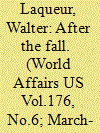

|
|
|
|
|
| Publication |
2014.
|
| Summary/Abstract |
As the Soviet Union disintegrated, ending on the ash heap of history in 1989-91, all the institutes for the study of Marxism-Leninism that had justified the regime, the collected and selected works of the communist classics, and the Marxism chairs in academies and universities also disappeared. From this void emerged a burning question: What was the raison d'être of the existing political system? And later, how did the new regime justify itself in the field of foreign and domestic affairs, and what was its social and economic policy? For the answers, Vladimir Putin and his followers went back to the future. Russia's official ideology prior to 1917 was Pravoslavie, Samoderzhavie,Narodnost, which has been translated as Orthodoxy, Autocracy, Nationality. This statement was made first by Sergei Uvarov, the Russian minister of education, in a circular letter in 1833. Uvarov was a learned man who also served as president of the Russian Academy of Sciences. No one had asked Uvarov to prepare such an official binding declaration. However, Czar Nicholas I liked this "triad," as it was called, even though its meaning was by no means always clear.
|
|
|
|
|
|
|
|
|
|
|
|
|
|
|
|
| 2 |
ID:
132411
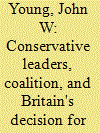

|
|
|
|
|
| Publication |
2014.
|
| Summary/Abstract |
Conservative leaders may have had a decisive impact on the decision by the Liberal government to enter the Great War in August 1914. In a seminal article of 1975, Keith Wilson argued that their readiness to fight "cut the ground … from beneath the feet of the non-interventionists" in the Cabinet. Those ministers who had hitherto opposed war now recognised that continued divisions could bring the government's collapse, in which case the Unionists, probably in a coalition with pro-war Liberals, would take office and enter the conflict anyway. Since Wilson's essay, important light has focussed on Unionist thinking by works that look at the July Crisis as part of a longer party history. This analysis provides a detailed investigation of the actions of Unionist leaders in the days immediately leading to war. It resolves some of the main contradictions in the primary evidence, argues that the possibility of a coalition was very real and demonstrates that one key player-the first lord of the Admiralty, Winston Churchill-subsequently tried, with some success, to disguise his activities.
|
|
|
|
|
|
|
|
|
|
|
|
|
|
|
|
| 3 |
ID:
123105
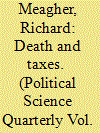

|
|
|
|
|
| Publication |
2013.
|
| Summary/Abstract |
RICHARD MEAGHER describes how and why the estate tax became part of the pro-family agenda of social conservatives. He explores the role of estate tax repeal in maintaining the alliance between economic and social conservatives within the Republican Party.
|
|
|
|
|
|
|
|
|
|
|
|
|
|
|
|
| 4 |
ID:
130197
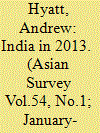

|
|
|
|
|
| Publication |
2014.
|
| Summary/Abstract |
The Congress-led coalition battled through another difficult year with issues of governance continuing to cause difficulty for the government. The economy performed unevenly, with high rates of inflation and slower economic growth. Close relations were maintained with the U.S., but relations with China remained awkward. Pakistan and India made little headway on improving relations. Campaigning for the 2014 general election began midway through 2013.
|
|
|
|
|
|
|
|
|
|
|
|
|
|
|
|
| 5 |
ID:
129478


|
|
|
|
|
| Publication |
2013.
|
| Summary/Abstract |
In the fourth quarter of 2013, there are two cases which might bring implications for both Indonesia as well as ASEAN in the near future. Firstly, the change of government in Australia from the former Labour Party to a Liberal-National coalition has immediately created tension in the bilateral relations of Indonesia and Australia after some period of smooth and constructive relations especially in dealing with the threat of terrorism. The policy of the new administration under Prime Minister Tony Abbott to curb the numbers of boat people coming to Australia has been viewed by Indonesia as challenging its national sovereignty. The second important case is the result of the ASEAN Summit in Brunei Darussalam. The relative success of this
Summit, following a shameful failure of ASEAN to come out with a Joint Communique in Phnom Penh the previous year, has to some ex- tent brought ASEAN back on track towards establishing an ASEAN Community in 2015.
|
|
|
|
|
|
|
|
|
|
|
|
|
|
|
|
| 6 |
ID:
131006
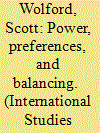

|
|
|
|
|
| Publication |
2014.
|
| Summary/Abstract |
Conflicts can expand when third parties perceive future threats from attackers, but how do they evaluate threats from coalitions rather than single states? Multilateral aggregations of power can generate fear in observers that coalitions may soon turn against them. Yet only some provoke opposition from observers, reducing their chances of success and expanding the conflict, while others do not. What accounts for this difference? I analyze a game-theoretic model of a third party's decision to intervene in an ongoing conflict and a coalition's decision to disband afterward, which is most likely when its preferences are diverse. When coalitions are powerful, an increasing diversity of foreign policy preferences reduces the probability that observer states balance against them, but when coalitions are weak, increasing diversity increases the probability of balancing. I find support for this conditional relationship between power, preferences, and balancing in a sample of 180 interstate crises from 1946 to 2000.
|
|
|
|
|
|
|
|
|
|
|
|
|
|
|
|
| 7 |
ID:
128364


|
|
|
|
|
| Publication |
2011.
|
| Summary/Abstract |
Ambiguous, often contradictory, assessments of the achievements of NATO/ISAF operations in Afghanistan make it difficult to form a clear picture of the situation on the ground.' However, there is a strong perception that the coalition troops are ?oundering in a quagmire. What began as a campaign with a fairly precise set of objectives soon escalated into a grandiose attempt to re-form an entire society. Today, despite the rhetoric of politicians and military leaders who speak of 'sticking it Out' till the job is done, there are unmistakable signals that, as Lord Ashdown commented in November 2010, the endgame has started.' Whether or not a workable strategy has ?nally been put in place is uncertain, what is clear is that electorates back home have lost patience with the mission. Thus the emphasis now is to fashion an exit strategy that will provide a facade of success, justifying, albeit weakly, the claim of 'mission accomplished'.
|
|
|
|
|
|
|
|
|
|
|
|
|
|
|
|
| 8 |
ID:
123426
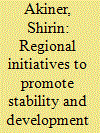

|
|
|
|
|
| Publication |
2011.
|
| Summary/Abstract |
Ambigous, often contradictory, assessments of the achievements of NATO/ISAF operations in Afghanistan make it difficult to form a clear picture of the situation on the ground. However, there is a strong perception that the coalition troops are floundering in a quagmire. What began as a campaign with a fairly precise set of objectives soon escalatedinto a grandiose attempt to re-form an entire society. Today, despite the rhetoric of politicians and military leaders who speak of 'sticking it out' till the job is done, there are unmistakable signals that, as Lord Ashdown commented in November 2010, the endgame has started. Whether or not a workable strategy has finally been put in place is uncertain, what is clear is that electorates back home have lost patience with the mission. Thus the emphasis now is to fashion an exit strategy that will provide a facade of success, justifying, albeit weakly, the claim of 'mission accomplished'.
|
|
|
|
|
|
|
|
|
|
|
|
|
|
|
|
| 9 |
ID:
128633
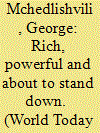

|
|
|
| 10 |
ID:
127817
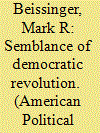

|
|
|
|
|
| Publication |
2013.
|
| Summary/Abstract |
Using two unusual surveys, this study analyzes participation in the 2004 Orange Revolution in Ukraine, comparing participants with revolution supporters, opponents, counter-revolutionaries, and the apathetic/inactive. As the analysis shows, most revolutionaries were weakly committed to the revolution's democratic master narrative, and the revolution's spectacular mobilizational success was largely due to its mobilization of cultural cleavages and symbolic capital to construct a negative coalition across diverse policy groupings. A contrast is drawn between urban civic revolutions like the Orange Revolution and protracted peasant revolutions. The strategies associated with these revolutionary models affect the roles of revolutionary organization and selective incentives and the character of revolutionary coalitions. As the comparison suggests, postrevolutionary instability may be built into urban civic revolutions due to their reliance on a rapidly convened negative coalition of hundreds of thousands, distinguished by fractured elites, lack of consensus over fundamental policy issues, and weak commitment to democratic ends.
|
|
|
|
|
|
|
|
|
|
|
|
|
|
|
|
| 11 |
ID:
134048
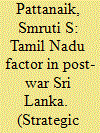

|
|
|
|
|
| Publication |
2014.
|
| Summary/Abstract |
Growing international concerns about human rights violations in the last phase of the Eelam war and the continued surveillance and intimidation of the Tamils in Sri Lanka have drawn the attention of their co-ethnics across the world. The southern Indian state of Tamil Nadu, which had detached itself from the political events in Sri Lanka after Rajiv Gandhi's assassination, has renewed its interest. In the post-war phase, the plight of Sri Lankan Tamils has become an emotive issue. Their grievances have been harnessed in recent years for political advantage by several political parties in Tamil Nadu. The politics of coalition has, in fact, made it difficult for New Delhi to pursue a policy independent of Tamil Nadu. This article examines how the Tamil-speaking people in Sri Lanka view the role of Tamil Nadu; their perception of the 13th Amendment; and India's options in post-war Sri Lanka
|
|
|
|
|
|
|
|
|
|
|
|
|
|
|
|
|
|
|
|
|